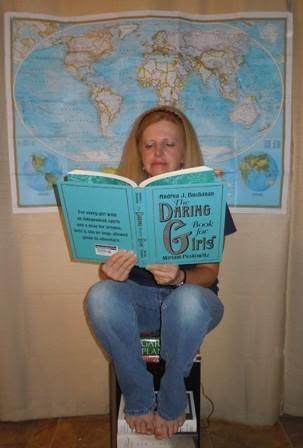Cheryl Hughes: What She Needed From Me
When I started seventh grade, there was a new girl in class. At the age of thirteen, she was already a classic beauty. Tall, long dark hair, Angelina Jolie lips—you know the type. She was poised and quiet and surprisingly kind. I didn’t expect kind. We became friends.
Our backgrounds were similar. We both lost our mothers at an early age—mine to divorce, hers to a car accident. We were both raised by stepmothers who didn’t want to raise us and by fathers who were caught up in their own lives. She moved in with her grandparents, who did want to raise her.
In seventh grade, when we met, she was already a severe diabetic—two shots a day—but she had a very optimistic outlook. I needed an optimistic outlook. I wasn’t sure I had anything she needed, but she stayed my friend throughout middle school and high school.
After graduation, we left for college at WKU, riding in the back of her uncle’s pickup with the camper cover. We lived on State Street in Bowling Green, and worked as waitresses for the summer in order to save money for fall tuition at Western.
That first week in Bowling Green, we attended a church on Park Street. She met a guy who would become her husband fourteen months later. She completed her nursing degree then worked for a few years before becoming pregnant. She gave birth to a little girl, but that pregnancy would take its toll on her body. Against the advice of her obstetrician, she became pregnant again two years later. Her doctor was livid. He told her to get herself to a specialist in Nashville. She did. A second daughter was born to the couple. Her body barely survived the pregnancy, and she was no longer able to work a public job.
She embraced her role as mother and homemaker, living for her husband and children. But as her children grew, so did her health problems. She developed Lupus, and her diabetes continued to plague her. She had blackouts that caused falls and fractures, and at least twice, nearly lapsed into a diabetic coma.
Throughout the years, we kept in touch. Each time I saw her, she would tell me things she couldn’t tell others. Her husband’s temper and inability to handle finances, her youngest daughter’s disrespect, the loss of two houses and farms, the last one, a house they had built. She cried. I listened. She tried to be enough for them, her family. She never was.
The last time I saw her, she was barely recognizable, ravaged by the very disease she carried in her body on the first day I met her. She was in a hospital room, her youngest daughter talking to her as if she were a child. Telling on her to me, her friend, “She tries to sneak Daddy’s cookies when he’s not there.” She is embarrassed that her daughter has told me these things. It’s all I can do to keep from putting a stop to all of this, to call for an ambulance and give them directions to my house, so I can keep her with me, far away from the condescension of her family.
I told her goodbye that day. I knew I would never see her alive again. She passed away on Wednesday. The memorial service was on Saturday. She was cremated, a small box of her ashes on a table, a picture of the beauty she had been on her wedding day above it.
The minister in charge of her eulogy spoke of the wonderful marriage she and her husband had shared. I knew better. “I was the one person she could tell the truth,” I thought. It was then I realized, that was the thing she needed from me.
After the service, I hugged her oldest daughter. She cried as she told me, “She loved you so much.” I forget who said, “Our greatest need isn’t to be loved. Our greatest need is to love.” I stood crying, in her daughter’s arms, letting my friend simply love me.
- Log in to post comments



























